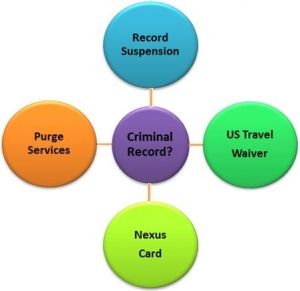Traveling Outside Canada with a Record
United States Waiver of Inadmissibility

In addition to a Record Suspension, you may need to consider other applications such as a US Travel Waiver, Nexus Card or Purge Services.
According to the Parole Board of Canada, a Canadian Pardon (now called Record Suspension) is not recognized outside Canada. Specifically, they state: “Many foreign countries, including the United States (U.S.), do not recognize a Canadian Pardon. If you have a criminal record and are interested in going to the U.S., you may want to apply for a United States Waiver (American INS Waiver).” For more information, visit: United States Waiver.
Frequent travellers may need a US Waiver and Pardon (or Record Suspension) to qualify for a Nexus Card so that they may avoid long line ups when entering the United States.
According to the Parole Board of Canada:
Because a Pardon is awarded under Canadian Law it does not have legal force outside of Canada. The authorities of foreign countries can not be compelled to delete or withdraw criminal record information from their own records. Although a Pardon can be considered a positive factor, it does not guarantee entry on foreign soil.
Travelling to Other Foreign Countries with a Criminal Record
Most countries will not inquire as to whether you have a criminal record when travelling to their country unless you plan to (a) visit their country for more than 6 months; (b) immigrate to their country; or (c) obtain a work visa for their country. You will need to check the Consulate of the Country to which you are travelling to determine if your record will prevent you from entering. This obstacle will be removed once you obtain a Canadian Pardon or Record Suspension in most cases.
NOTE: If you are inadmissible to the United States, you cannot travel to a foreign country via stop-over in the United States unless you have a Waiver of Inadmissibility.
Can my pardoned or suspended file be disclosed to the United States or other countries?
According to the Parole Board of Canada, the Solicitor General may choose to disclose a pardoned file (or Record Suspension) to the United States or any other country without your consent or knowledge. They specifically state:
Under the CRA, only the Solicitor General of Canada has the authority to disclose information from a pardoned Record…if satisfied that the disclosure is desirable in the interests of the administration of justice or for any purpose related to the safety or security of Canada or any state allied or associated with Canada.
According to Sec. 212(a)(6)(i) of the United States Immigration and Nationality Act[8 U.S.C. 1182], misrepresentation is defined as:
In general – Any alien who, by fraud or willfully misrepresenting a material fact, seeks to procure (or has sought to procure or has procured) a visa, other documentation, or admission into the United States or other benefit provided under this Act is inadmissible.
According to McWhirter, R.J. (The Criminal Lawyer’s Guide to Immigration Law: Questions and Answers, Alberta Bar Association: 2006, 2nd Ed., p. 261.),
…denying a criminal conviction violates 18 U.S.C. § 1546.
Can I Obtain a Passport?
According to Passport Canada:
The fact that a person has a criminal record will not necessarily prevent that person from obtaining a passport. We examine all passport applications and establish eligibility on a case-by-case basis.
It is my experience your passport would only be denied if you are serving or facing a sentence that prohibits travel or if a restriction was placed on your passport due to unpaid child support.
Possessing a passport does not guarantee you entry privileges into another country and does not help you overcome grounds for inadmissibility. When your Passport is scanned at a port of entry of a foreign country, it is being scanned to see if it is valid or if it has been reported stolen. It is not ordinarily linked to a criminal record. U.S. authorities would typically have to go to a different database to see if you have a criminal record, unless your passport was previously linked by them to a criminal record.
CAUTION: The United States Border Pre-Screening Officer may decide to check for a criminal record upon entry, at some point during your trip, or long after your trip. US Authorities may store biographic information about you which was obtained from your passport upon entry and search for a criminal record at a later date. Illustration: I’ve had clients pass US Pre-Clearance at an International Airport in Canada, arrive at an International Airport in the USA (ie. Hawaii) only to immediately be deported back to Canada on the next available flight (or spend the night in jail if no flight is available until morning).

